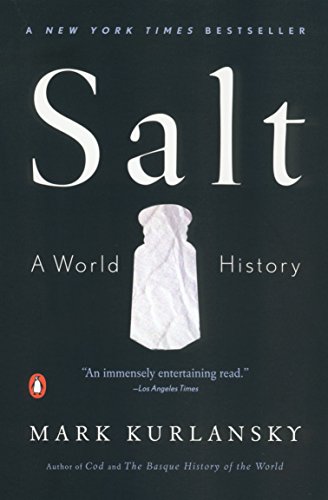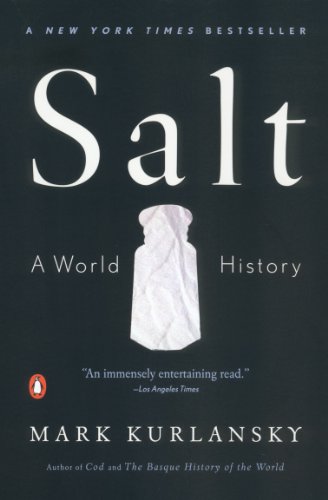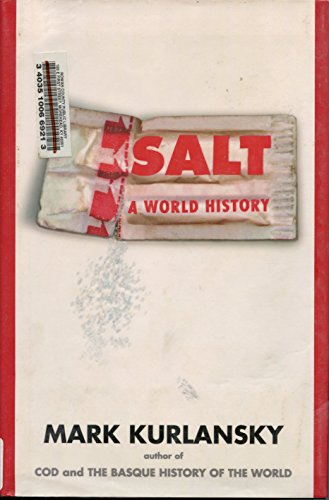-
Salt: A World History
Mark Kurlansky, Scott Brick, Phoenix Books
Audible Audiobook (Phoenix Books, Feb. 20, 2003)So much of our human body is made up of salt that we'd be dead without it. The fine balance of nature, the trade of salt as a currency of many nations and empires, the theme of a popular Shakespearean play... Salt is best selling author Mark Kurlansky's story of the only rock we eat. From its single origin, to the other discoveries made because of it, fascinating tales of salt and the people who have been involved with it through the ages are interwoven here. Fifteen recipes are included that will meet with every taste. Mark Kurlansky has produced a kaleidoscope of history, a multi-layered masterpiece that blends economic, scientific, political, religious, and culinary records into a rich and memorable tale.
-
Salt: A World History
Mark Kurlansky
Paperback (Penguin Books, Jan. 28, 2003)An unlikely world history from the bestselling author of Cod and The Basque History of the WorldIn his fifth work of nonfiction, Mark Kurlansky turns his attention to a common household item with a long and intriguing history: salt. The only rock we eat, salt has shaped civilization from the very beginning, and its story is a glittering, often surprising part of the history of humankind. A substance so valuable it served as currency, salt has influenced the establishment of trade routes and cities, provoked and financed wars, secured empires, and inspired revolutions. Populated by colorful characters and filled with an unending series of fascinating details, Salt is a supremely entertaining, multi-layered masterpiece.
-
Salt: A World History
Mark Kurlansky
eBook (Penguin Books, Jan. 28, 2003)An unlikely world history from the bestselling author of Cod and The Basque History of the WorldIn his fifth work of nonfiction, Mark Kurlansky turns his attention to a common household item with a long and intriguing history: salt. The only rock we eat, salt has shaped civilization from the very beginning, and its story is a glittering, often surprising part of the history of humankind. A substance so valuable it served as currency, salt has influenced the establishment of trade routes and cities, provoked and financed wars, secured empires, and inspired revolutions. Populated by colorful characters and filled with an unending series of fascinating details, Salt is a supremely entertaining, multi-layered masterpiece.
-
Salt: A World History
Mark Kurlansky
eBook (Vintage Digital, Sept. 30, 2011)Homer called it a divine substance. Plato described it as especially dear to the gods. As Mark Kurlansky so brilliantly relates here, salt has shaped civilisation from the beginning, and its story is a glittering, often surprising part of the history of mankind. Wars have been fought over salt and, while salt taxes secured empires across Europe and Asia, they have also inspired revolution - Gandhi's salt march in 1930 began the overthrow of British rule in India. From the rural Sichuan province where the last home-made soya sauce is produced to the Cheshire brine springs that supplied salt around the globe, Mark Kurlansky has produced a kaleidoscope of world history, a multi-layered masterpiece that blends political, commercial, scientific, religious and culinary records into a rich and memorable tale.
-
Salt: A World History
Mark Kurlansky
Hardcover (Walker Books, Jan. 1, 2002)Homer called salt a divine substance. Plato described it as especially dear to the gods. Today we take salt for granted, a common, inexpensive substance that seasons food or clears ice from roads, a word used casually in expressions ("salt of the earth," take it with a grain of salt") without appreciating their deeper meaning. However, as Mark Kurlansky so brilliantly relates in his world- encompassing new book, salt―the only rock we eat―has shaped civilization from the very beginning. Its story is a glittering, often surprising part of the history of mankind.Until about 100 years ago, when modern chemistry and geology revealed how prevalent it is, salt was one of the most sought-after commodities, and no wonder, for without it humans and animals could not live. Salt has often been considered so valuable that it served as currency, and it is still exchanged as such in places today. Demand for salt established the earliest trade routes, across unknown oceans and the remotest of deserts: the city of Jericho was founded almost 10,000 years ago as a salt trading center. Because of its worth, salt has provoked and financed some wars, and been a strategic element in others, such as the American Revolution and the Civil War. Salt taxes secured empires across Europe and Asia and have also inspired revolution (Gandhi's salt march in 1930 began the overthrow of British rule in India); indeed, salt has been central to the age-old debate about the rights of government to tax and control economies. The story of salt encompasses fields as disparate as engineering, religion, and food, all of which Kurlansky richly explores. Few endeavors have inspired more ingenuity than salt making, from the natural gas furnaces of ancient China to the drilling techniques that led to the age of petroleum, and salt revenues have funded some of the greatest public works in history, including the Erie Canal, and even cities (Syracuse, New York). Salt's ability to preserve and to sustain life has made it a metaphorical symbol in all religions. Just as significantly, salt has shaped the history of foods like cheese, sauerkraut, olives, and more, and Kurlansky, an award-winning food writer, conveys how they have in turn molded civilization and eating habits the world over. Salt is veined with colorful characters, from Li Bing, the Chinese bureaucrat who built the world's first dam in 250 BC, to Pattillo Higgins and Anthony Lucas who, ignoring the advice of geologists, drilled an east Texas salt dome in 1901 and discovered an oil reserve so large it gave birth to the age of petroleum. From the sinking salt towns of Cheshire in England to the celebrated salt mine on Avery Island in Louisiana; from the remotest islands in the Caribbean where roads are made of salt to rural Sichaun province, where the last home-made soya sauce is made, Mark Kurlansky has produced a kaleidoscope of history, a multi-layered masterpiece that blends economic, scientific, political, religious, and culinary records into a rich and memorable tale.
-
Salt: A World History
Mark Kurlansky
Hardcover (Thorndike Pr, July 1, 2002)FOR USE IN SCHOOLS AND LIBRARIES ONLY. A history of salt notes its role as currency, in the establishment of trade routes and cities, and as an agenda of war, noting key figures who played major parts in its manufacture and distribution.
-
Salt: A World History
Mark Kurlansky, Scott Brick
Audio CD (Phoenix Audio, May 1, 2006)The author of "Cod" and "The Basque History of the World" takes an extraordinary look at an ordinary substance--salt, the only rock humans eat--and how it has shaped civilization from the very beginning. Unabridged. 14 CDs.
-
Salt - A World History
Mark Kurlansky
Hardcover (Walker And Company, March 15, 2002)Excellent Book
-
Salt. A World History
Mark Kurlansky
Hardcover (Jonathan Cape Ltd, March 15, 2002)None
-
Salt: A World History
Mark Kurlansky
Paperback (Vintage/Ebury (a Division of Random, Feb. 1, 2010)Homer called it a divine substance. Plato described it as especially dear to the gods. As Mark Kurlansky so brilliantly relates here, salt has shaped civilization from the beginning, and its story is a glittering often surprising part of the history of mankind. So valuable that it has often served as currency and still does in places today, salt inspired the earliest trade routes across unknown oceans and the remotest deserts. Wars have been fought over salt, and while salt taxes secured empires across Europe and Asia, they have also inspired revolution - Gandhi's salt march in 1930 began the overthrow of British rule in India. From the rural Sichuan province where the last home-made soya sauce is made to the Cheshire brine springs that supplied salt around the globe, Mark Kurlansky has produced a kaleidoscope of world history, a multilayered masterpiece that blends political, commercial, scientific, religious and culinary records into a rich and memorable tale.
-
Salt: A World History
Mark Kurlansky, Scott Brick
Audio CD (New Millenium Audio, Jan. 1, 2003)A history of salt notes its role as currency, in the establishment of trade routes and cities, and as an agenda of war, noting key figures who played major parts in its manufacture and distribution. Read by Scott Brick.
-
Salt : A World History
Mark Kurlansky
Paperback (Vintage Canada, March 15, 2002)None